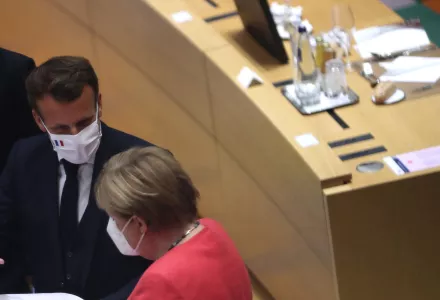
Our weekly COVID-19 and Economic Diplomacy tracker looks at policies that impact the coordination of international governments and central banks, ongoing commentary and analysis, and asks what these turbulent times mean for economic diplomacy.
We’d love to hear what you think. Send us your comments, and be sure to follow us on Twitter @BelferEDI.
The Highlights
- The U.S. Congress has yet to devise a coronavirus budget plan as 20 million Americans are at risk of losing emergency unemployment benefits at the end of this month and 12 million are at risk of being evicted by the end of this week.
- The EU passed a landmark €750bn recovery package, €390 bn of which is allocated for weakened member states. In exchange for these grants, frugal states received a boost in budget rebate. Overall, the complete spending package totals $1.8 trillion with over $1 trillion allocated for a multiyear EU budget from 2021-2027.
- Latin America could soon face a debt crisis worse than the one they experienced in the 1980s. Brazil’s debt-to-GDP ratio could jump close to 100%; Chile’s total debt rose 30% year-on-year in the first quarter. Mexico’s GDP could plummet 10.5% this year.
U.S. Developments
As the U.S. surpasses 3.8 million cases and 140,000 COVID-19 related deaths, the administration continues to struggle to respond to the virus.
- With more than 20 million Americans at risk of losing emergency unemployment benefits when they expire at the end of this month, Republicans struggle to formulate a coronavirus budget plan. It appears likely that the legislative process will spill into August. Though Treasury Secretary Steven Mnuchin initially stated the goal was to keep the spending bill around $1 trillion, that no longer seems to be the case. Mnuchin, White House Chief of Staff Mark Meadows, and White House National Economic Council Director Larry Kudlow met with Senate Republicans over lunch earlier this week but little progress has been made. Republicans are not supportive of the administration’s payroll tax cut or curbed funding for coronavirus tests and the CDC. A federal eviction moratorium ends this week putting 12 million tenants at risk.
- The IMF cites the dollar’s exchange rate as a key factor in the pace of global economic recovery. Weaker exchange rates will be a less effective shock absorber than in the past due to the dollar’s role as the dominant invoicing and financing currency. According to the Economist, at least half of cross-border trade invoices are in USD which is 5x America’s share of world goods imports and 3x its share of exports. Two-thirds of global security issuance and foreign-exchange reserves are in USD. Surges in coronavirus cases and renewed demand from investors could strengthen the dollar’s exchange rate, amplifying the “short-term fall in global trade and economic activity. The IMF states that a strong dollar will have a “contractionary effect” on global economic activity.
- Quest Diagnostics, the largest lab company in the US, says it will be impossible to increase coronavirus testing capacity to cope with demand during the autumn flu season. Testing companies, including Quest, are already struggling to keep up with demand. Currently, testing results are delayed by about a week, rendering testing virtually pointless. The capacity issue is due to a shortage of chemical reagents and machines - “we would double our capacity tomorrow...but it’s not labs that are the bottleneck. [It] is our ability to get physical machines, and more importantly, our ability to feed those machines with chemical reagents.”
- Elizabeth Warren pens an oped in the New York Times outlining a plan on how to respond to the pandemic. Legislation must address four things - public health, resources for education, businesses, and state and local governments, burdens of communities of color, and struggling families. She writes that the federal response must include increased testing, a national contact-tracing program, and supply chain investments to resolve medical supply shortages. The next legislative package should include at least $500bn to stabilize state and local governments and at least $175bn for public schools. It must also include $50bn in emergency support to child care businesses and at least $350bn to Black, Latino, and Indian Country communities who have been the hardest hit by the pandemic. She also supports extending and expanding the national eviction moratorium, broadly canceling student loan debt, tying unemployment insurance to real-time economic data, and strengthening the Occupational Safety and Health Administration (OSHA).
- Ben Bernanke and Janet Yellen testified before the Select Committee on the Coronavirus Crisis urging Congress to do more to support the economy. In particular, they argued for Congress to do more to help states which are seeing reduced sales tax and other revenues with growing costs. Yellen stated that the budget shortfall for states alone could cost $55bn through 2022. The former Fed chairs also suggested that the Fed itself may need to do more by adding a new program that subsidizes banks that make loans to qualifying borrowers, similar to funding-for lending programs run by the ECB and Bank of England.
- A Congressional Oversight Commission report asks whether the Fed’s plans to buy corporate bonds is a necessary use of government funds. Given that corporate bond markets are functioning well and big companies are issuing bonds at a rapid pace, the report questions whether these purchases are necessary. The Fed noted that it has decreased the pace of purchases and is prepared to slow them down even more.
- Robert Lighthizer responds to critics of his Foreign Affairs piece on the administration’s trade policy. He argues that the primary case for TPP was a geopolitical one, not an economic one. The downsides of the deal were numerous and the economic benefits could be gained through other means. Whether the geopolitical objective was to reform China through its eventual joining or to be a counterweight to Beijing, Lighthizer believes that the best leverage is Chinese dependence on the US market. He takes umbrage with the critique that the administration has alienated its allies, stating that the US has worked closely with its allies and partners on China. Moreover, alliances can only do so much. He also directly addresses the arguments put forth by Chad Bown who wrote a response to the original essay.
- James Politi in the Financial Times offers an in-depth analysis of whether the U.S. economic rebound is already over. The share of US adults employed fell 1 percentage point from mid-June to early July, after it had been climbing steadily since early May. The consumer sentiment index dropped to 73.2, back to its April levels. Though employment and retail sales and manufacturing showed some signs of improvement, those gains will be lost with new outbreaks.
European Developments
After five days of negotiation, the European Union has reached a deal on a €750bn recovery package hailed by some as the bloc’s Hamiltonian moment.
- The European Union has reached a deal on a €750 bn coronavirus recovery package. The deal centers on a €390 bn program for weakened member states. In exchange for these grants, frugal states received a boost in budget rebates. Austria’s annual reduction will double to €565mn while the Netherlands’ rebate will increase to €1.92bn. Mark Rutte, informal leader of the frugal states, also secured a clause that allows any country to raise concerns that another was not honoring its promise to reform its economy and temporarily halt transfers of EU recovery money. The European Commission will undertake massive borrowing on the capital markets for the first time. Overall, the complete spending package totals $1.8tn with over $1tn allocated for a multiyear EU budget from 2021-2027. The Financial Times also offers a breakdown of how the recovery fund will work.
- European economic activity suggests that the pandemic’s economic damage will be longer-lasting than hoped. Though travel and tourism is picking up industry and trade indicators have plateaued well below normal activity levels with no sign of any improvements in the labor market.
- European banks are facing as much as €800bn in loan losses and a €30bn hit to their revenue over the next three years. A report from Oliver Wyman estimates that if most countries avoid a second lockdown, bad debts could surge to €400bn, about 2.5 times the level in the prior three years. However, if a second wave hits, bad debts would increase to €800bn and banks’ non-performing loan ratios rise to 10% of their total lending. European banks have been slow to recover from the 2008 recession but the “pandemic is unlikely to cripple the sector. They will be highly susceptible to further shocks, tend to be risk averse in lending, and will struggle to fund transformation efforts.”
Emerging Markets
The pandemic continues to hit emerging markets the hardest as it has only exacerbated long-standing, underlying issues.
- Economists warn that Latin America may soon face a debt crisis worse than the one in the 1980s. The pandemic has only exacerbated “pre-existing conditions” of anaemic growth, weak health systems, low tax revenues, high levels of borrowing, and an over-reliance on commodity exports. Lockdowns and costly rescue programs have led to Chile, Brazil, and Mexico having the biggest increase in debt to GDP this year. Brazil’s debt-to-GDP ratio could jump close to 100%; Chile’s total debt rose 30% year-on-year in the first quarter. Mexico’s GDP could plummet 10.5% this year.
- Moody’s has clashed with the UN, putting Ethiopia, Pakistan, Cameroon, Senegal, and the Ivory Coast on review for a downgrade saying that the G20-backed debt suspension scheme poses risks to private creditors. The G-20 backed initiative allows countries to freeze official bilateral debt repayments due this year to member nations and members of the Paris Club. The rating agency argues that the scheme raises the risk of losses for investors in the countries’ bonds. The UN has taken issue with Moody’s saying that the scheme “‘should improve countries’ debt sustainability, and therefore should not be a basis for credit downgrades.”
Odds and Ends
- Camille Busette, Senior Fellow at Brookings, testified before the House Financial Services Subcommittee on Investor Protection, Entrepreneurship, and Capital Markets, on promoting economic recovery for communities of color and low-wage workers.
- Simone Perez and Paola Ramos report on how coronavirus is devastating the Navajo reservation which has one of the highest per-capita rates of COVID infection in the U.S. The Navajo Nation has tallied 8,593 cases and 422 deaths -- more confirmed cases than 10 states and more deaths than 16 states.
- Pavlina Tcherneva argues for a federal job guarantee in Foreign Affairs. A public option for jobs, it would be a permanent, federally funded but locally administered program that would provide voluntary public-service employment opportunities at living wages to anyone looking for such work.
Suh, Hannah. “This Week in COVID-19 and Economic Diplomacy: ‘A Deal for Europe but not for the U.S.’.” July 23, 2020


